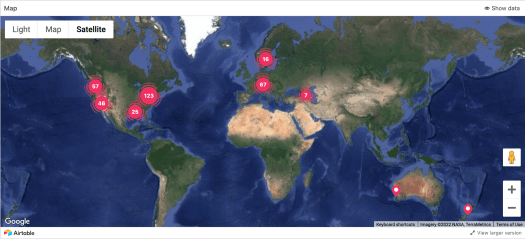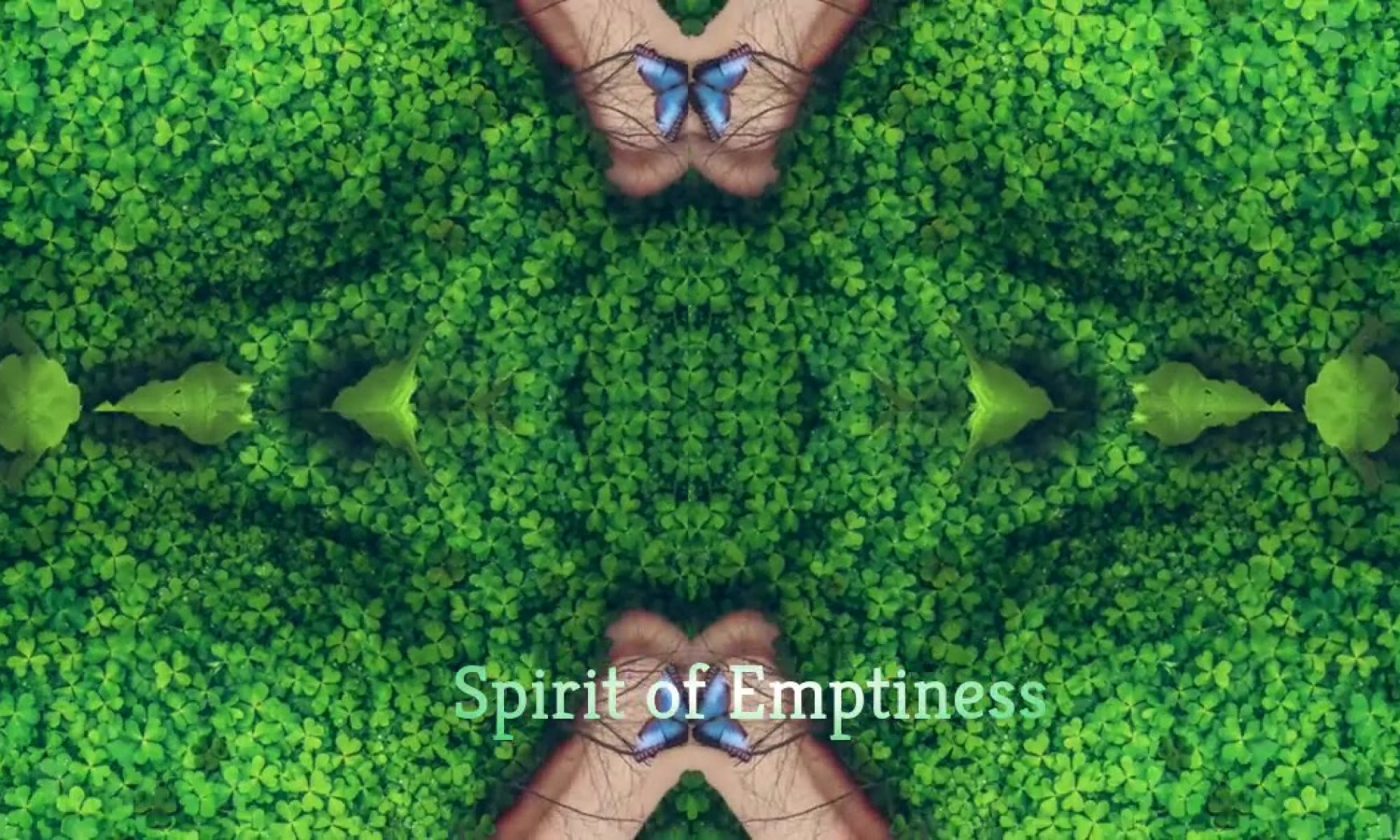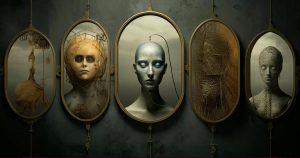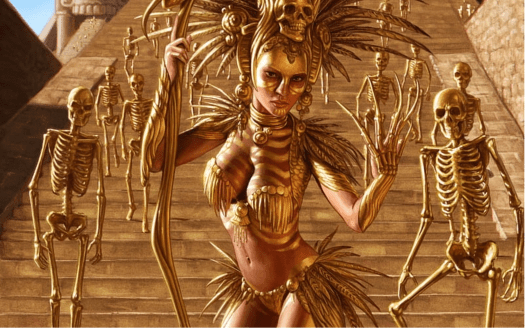
― Gregory David Roberts, Shantaram
In the second episode of Shantaram, available on AppleTV, Lin steps out of his friend Prabaker’s tent in one of Bombay’s sprawling slums. He looks around at all the people in the bustling slum who are looking at him and wonders if they are afraid of him and hate him. He knows he doesn’t belong there, but fate has put him there.
Thinking to himself, he says something like this: “It is what people know about themselves that make them afraid of you.“
In A World…
I rewound and watch this moment again. I was not expecting a nugget of wisdom in this drama. But, there it was…something real, something true, something very pertinent to the world we live in now. Today, no matter where you live, we live in a world….
…where MAGA Republicans think all Democrats are evil beings who drink the blood of children. This belief makes liberals and Democrats not really human. If they aren’t really human, then that makes it all right to kill them, all of them.
“Oh? You don’t believe me?”
Listen to this man right here. He’s the man with the littlest Wiennie of them all. The man in the middle touting hate, lies, deception, stories of separation, fear, and division. He’s Steve Bannon.
This little man, Trump’s Rasputin, knows that a democracy divided is easy to control. And he wants to control everything. Look at his beady eyes and scrubby stubble. He’s a tormented man doing everything to create confusion, chaos, and destruction so he can rise as a Christ for a world of sinners. If you have not seen CNN’s special report Divided We Fall, it is time to watch it.

“Oh — you don’t trust CNN?“
“You say it’s the radical left touting Joe Biden’s radical agenda…and before that it was Hillary….and before that it was Obama…and before and before…”
How far back should we go with the blame game and ‘I don’t trust you‘ contest? To Adam and Eve? Is it really that nasty little snake who started it all?
If you’re playing this game, you have already swallowed the Red Pill, and it’s working its toxic poison deep inside of you. It’s a poison that makes you deeply afraid of others and deeply afraid of your own shadow. And, you probably should be deeply afraid of your own shadow.
That is what Lin is aware of while standing alone in the slum of Bombay. That sneaky shadow that lives inside all of us casting its evil intensions and desires onto everyone else, except for you.
If you are playing this game, you have joined the ranks of people who violently participate in the denial of diversity. You do this to legitimize your own violent fear of anyone who doesn’t walk like you, talk like you, look like you, act like you, or think like you. You secretly believe and harbor a wish to bring into being a world that obeys and worships you.
The dirty little secret is hidden deep inside of you is a greedy, little, bloodthirsty thing who rages and whines about inflicting pain and suffering onto others. You want to do this so that you can enjoy your comforts and privileges. You need to do this because how would you know you are enjoying comforts and privileges unless others are suffering?
When you get called out on your racism, homophobia, antisemitism, and racism, you rage. You rage against the radical liberals who are merely pointing out your evil shadow. But, you don’t want to see the evil inside of you. So you build a wall. It’s a really tall wall that is made from the seething anger and rage boiling inside of you. If anyone gets too near, it burns like a living fire.
‘God damn it!’ if anyone is going to penetrate you inner wall and see that howling, wounded, frighten, greedy thing that lives inside of you.
That thing…. that scoundrel, that fiend, rascal, rogue, fraudster, trickster, beast, son of a bitch, deviant thing, loser, weirdo, cry baby, stupid brutal bastard, and bully. But guess what? So am I, and so is everyone else you know. We all have this evil thing living inside of us.
It never goes away. It bubbles and boils and burns inside us all. It pursues and terrorizes us in our dreams. Lin says, “A dream is when a wish and fear come together. A nightmare is when they are the same thing.”
Remaining ignorant of your evil being merely locks it inside of you where it is hidden behind the carefully constructed idea of yourself (your persona: the role you play in your community and for your family). It is your personal internal prison cell behind the giant wall that you built to conceal your evil being. You built the wall so well, most of the time you can’t even see your evil being locked inside your mental prison cell with you.
This thing inside of you is relentless and torments you night and day. In an act of utter desperation, you spew it out onto others and shout in a voice dripping with rage and fury:
“There! There is the boogeyman!
There is the Devil!
There is the Evil Thing that must be annihilated!”
Or, if the other person (the boogeyman) was once part of your exclusive club of people who know the Truth and what is really going on, you might shout:
“Hang Mike Pence!!”
In a world where Putin calls the people of Ukraine Nazis. Never mind he is the one acting like the Nazi. He is the one full of hate. He is the one who has driven out close to a million Russian men because they don’t want to fight in his barbaric, poorly equipped, and pretty bad army. He is losing. So he resorts to lies and double downs on stupid while waging his limp, impotent Nuclear Weiner.
Do not be fooled by Putin’s weak, victim-based, impotent hysterics! He is exactly the type of man who would push the button.
In a world where Iran’s Moral Police beat up and kill young women simply for wearing their hijab too loosely. But it is themselves they are really policing. They are afraid that if they see a single strand of hair sticking out from a hijab, their Limp Weak Weiner will grow. And if this happens, they are afraid they’ll lose control and turn into the Devils they know themselves to really be deep, deep down inside. This corrupt and bankrupt regime has already killed 272 young people and beaten and/or tortured 1,110 others.
In each world outlined above, each man’s rigid, inflexible thinking and bullshit is camouflage for the shitty little men they really are. They lust after power and cluster together helping each other hold onto power and control in their stinking palaces riddled with long, long corridors of terror.
Maps of Hate
This is what the corruption is and this is what it does to human beings. It is a kind of moral bankruptcy. It takes root inside individuals who find each other and clump together in groups that try to take control in order to enforce their style and way of thinking. If they do get control, they quickly create systems that exclude diversity and impose their way of doing things in brutal ways meant to terrorize everyone else into compliance. When a government becomes populated by such individuals, it turns into a structural system of terror bent on brutalizing anyone who is not exactly like them.
There are three main mappable categories of this deadly psychic virus: Dictators, Terror Groups, and Hate Groups. But the corruption lives inside everyone and is readily expressed in every day transactions. You see it in families, in workplaces, in schools, between friends and lovers. It thrives in ignorance and lack of self-awareness. It particularly loves to reside inside narcissists!
Dictators of the World

This is a comprehensive, up-to-date list of the world's current dictators and authoritarian regimes. In 2022, there are 57 dictatorships in the world. We define a dictator as the ruler of a land rated “Not Free” by the Freedom House in their annual survey of freedom. See the interactive map and photos below or click to visit the current dictators category.
Of course, the dictators of the world will point to all the yellow areas of this map and claim, “There! There is the evil capitalists who are draining the world of resources and polluting our planet!”
They are not entirely wrong, expect they think in black and white, good and evil, right and wrong. They split the world into opposite halves. Then, they step inside the Good Bubble, created entirely inside their mind and spew out their pent-up boiling hate, vengeance, and destructive tendencies on everyone else. They never take responsibility for themselves. They are the consummate victim, and always the hero in their narcissistic story. And so, it is in this way that we (the human race) will split the planet into two unreconcilable halves and all die together in a seething puddle of hate.
Terror Groups
One step behind dictators and authoritarian rulers of the world are terror groups such as Boko Haram, ISIS, and Taliban (which actually managed to retake control of Afghanistan bumping them back up to the dictator map above). The map below shows terror groups around the world and provides a list of largest terrorist groups worldwide.
These are groups of people who twist words and religions to bolster their brutal causes. They are mostly stateless centers of terror who are trying to grab some land and people who they can crush and ruin.

Overall Terrorism Index Score: GTI is a composite measure made up of four indicators: incidents, fatalities, injuries and property damage. To measure the impact of terrorism, a five year weighted average is applied.
Hate Groups
One step behind terror groups are hate groups. Rather than centering their brutal activities in one spot or country, hate groups operate like a distributed network that hock, sell, and propagate hate. It is easier than ever to breed hate with the advent of the Internet and people who live their lives online.
Hate groups traffick outrage and outlandish accusations designed to divide the world into Us and Them, into people you can trust and people you can’t trust. Hate groups are insidious and invade peoples minds like a drug. Once you become addicted to hate, it is an addiction that is harder to kick than heroin. It is a poison to your mind that is more destructive than Meth. Hate literally changes the neural pathways of your brain.
The following images are from Jigsaw, an incredible website that helps you visualize hate.




Another excellent mapping project is the Hate-Map using real time data of hate events to create a map that shows hotspots and how hate is growing worldwide.

The Hate Map is populated with data submitted both by our internal researchers, the public and our network of volunteers. This data largely stems from publicly available news-sources and consolidations of information from other public data-sets and records. Existing records are however often limited in scope and fail to give a comprehensive picture of the global activities of the far right ranging from spread of propaganda and low-level activities through major terrorist incidents.
All data in the Hate Map is verified and quality controlled by internal researchers who are experts on far right extremism and experienced in the field of open source intelligence (OSINT) building on public sources and providing verifiable documentation before it is made available in our public-facing database and dashboard. Our researchers take great care to verify sources where there might exist any doubt. Links to external sources are provided for all our database entries in order to ensure that the public further can verify any incident independently.
Our dataset is cross referenced against the work of other institutions and organizations mapping the far right in order to ensure as comprehensive a picture of the global situation of the far right as possible, in keeping with the highest academic standards.
The Hate Map is a living document and both recent and historic events are added and verified on a daily basis. -- The Hate-Map
The Playbook
Regardless of if you are a dictator; an authoritarian ruler; a leader or member of a terror group; a leader or member of a hate group; a narcissistic boss, sibling, friend, or parent, you play from the same dirty handbook. That book repeats one mantra over and over, which is to inflict as much pain, terror, and suffering on your enemy (which is anyone who does not agree with you) while constantly claiming to be the victim. And if you can’t win that way, then you have the right to destroy everything.
This attitude, belief system, behavior is all a big cover up of who you really are. It is a smoke screen and distraction because deep, deep down inside yourself you feel inferior, impotent, dithering, confused, frighten, and like a limp Weiner. That’s why you run around the world hurting everyone else. If you can’t have it your way, then you want to be the first to destroy it!
Looking at these map, it is pretty clear we are not doing very well as species. No wonder we are not paying attention to Climate Change. Perhaps we won’t need to after all. The way things are going we will blow ourselves up before nature cleans us off the surface of the planet with climate disasters that are only getting bigger and more deadlier by the year… and this trend is only going bigger and badder not the other way.
Perhaps we all better stop, take a deep breathe, and listen to the Whale Songs again. The ones Vermont biologist Roger Payne captured and brought to us in the 1970s!
Gordon Snyder; 494 subscribers
Yetzer Harah
I realized this thing Lin said in the second episode of Shantaram is part of the puzzle of the Yetzer Harah.
I first heard about the Yetzer Harah while listening to Alan Watts lectures who describes it like this:
So, in Hebrew theology incidentally. That there is a thing called the yetzer harah. And in the beginning of time when God created Adam he implanted in him the yetzer hara and the yetzer hara means that wayward spirit. He put something funny in man so that man would be a little odd and it was a result of the yetzer hara that Adam was tempted by Eve who was tempted by the serpent to eat that famous fruit. And, but the Hebrew believes that everything that God created is good. Including the Yetzer Hara. Because if it hadn’t been for the yetzer hara, there would have nothing ever happened. Everybody would have obeyed God and God would have said well this is kind of a bore. Now that you see, you can’t you can’t just get up to someone and say disobey me, because if they do there are varying you. See that’s a double bind. Say to somebody disobey me but God is much more subtle than that. He didn’t tell Adam to disobey he told him to obey. But suddenly he put this yetzer hara thing in like that so that, God would say well I’m not responsible. For this thing’s going to happen on its own because what everybody wants is something to happen on its own. And everybody wants that. Because you see, this sensation of being you. This curious lonely center of awkward sensitivity, subject to the most peculiar feelings and pains and anxieties and all that sort of thing all that. Is an essential prerequisite for feeling something else. These two experiences go together. -- 2.4.9 Way Beyond Seeking Part 2; Alan Watts Organization
In short, the Yetzer Harah is why we do evil things, why we fear people we don’t know, why we wage wars, why we cheat each other… pretty much why we are living in the mess we made of the world today.
Shantaram tells the story of how Lin made a mess of his life (surely guided by his inner Yetzer Harah that tempted him into making a lot of bad choices that landed him in prison). Then, Lin makes a courageous choice, escapes from prison, and gets a second chance to live his life, which he is messing up again–gosh darn it!
I’m only on episode 2…so Lin is probably going to embark on different mistakes. And I bet he is going to grow from these mistakes because Lin demonstrates the capacity to reflect on his new situation and past mistakes, which pushing open the door of the prison cell inside your head, just a little bit, but if you look…there is vast and beautiful field of wisdom beyond your prison cell behind your wall of ignorance.
Is wisdom perhaps the reason God implanted the Yetzer Harah into man at the very beginning?
I suppose we will never know because clearly we are going to kill each other long before we can collectively learn how to embrace diversity and celebrate life in all its many facets and ways of being in the world.
Images For Archetypal Animations
Feature Archetypal Animation






Music: Down the Rabbit Hole: Emma Wallace [1] Rabbit Hole 2:02
Second Archetypal Animation
I was searching for exactly what Lin said to himself when he woke up the first morning in his friends tent in the Bombay slum. I could not find it, but I found a lot of other great quotes from Gregory David Roberts who is the author of Shantarm. So, I have sprinkled these in between the credits of where I found the images for this animation.

“Civilisation, after all, is defined by what we forbid, more than what we permit.”
― Gregory David Roberts, Shantaram
“Fear dries a man’s mouth, and hate strangles him. That’s why hate has no great literature: real fear and real hate have no words.” ― Gregory David Roberts, Shantaram
“For this is what we do. Put one foot forward and then the other. Lift our eyes to the snarl and smile of the world once more. Think. Act. feel. Add our little consequence to the tides of good and evil that flood and drain the world. Drag our shadowed crosses into the hope of another night. Push our brave hearts into the promise of a new day. With love; the passionate search for truth other than our own. With longing; the pure, ineffable yearning to be saved. For so long as fate keeps waiting, we live on.”
― Gregory David Roberts, Shantaram
“The past reflects eternally between two mirrors -the bright mirror of words and deeds, and the dark one, full of things we didn’t do or say.”
― Gregory David Roberts, Shantaram

“While I was chained to a wall and being tortured, I realized, through the screaming of my mind, that even in that shackled, bloody helplessness, I was still free: free to hate the men who were torturing me, or to forgive them. It doesn’t sound like much, I know. But in the flinch and bite of the chain, when it’s all you’ve got, that freedom is a universe of possibility. And the choice you make between hating and forgiving, can become the story of your life.” ~ Gregory David Roberts
“The truth is that there are no good men, or bad men,’ he said. ‘It is the deeds that have goodness or badness in them. There are good deeds, and bad deeds. Men are just men – it is what they do, or refuse to do, that links them to good and evil. The truth is that an instant of real love, in the heart of anyone – the noblest man alive or the most wicked – has the whole purpose and process and meaning of life within the lotus-folds of its passion. The truth is that we are all, every one of us, every atom, every galaxy, and every particle of matter in the universe, moving toward God.” ~ Gregory David Roberts
“It’s forgiveness that makes us what we are. Without forgiveness, our species would’ve annihilated itself in endless retributions. Without forgiveness, there would be no history. Without that hope, there would be no art, for every work of art is in some way an act of forgiveness. Without that dream, there would be no love, for every act of love is in some way a promise to forgive. We live on because we can love, and we love because we can forgive.” ~ Gregory David Roberts

“There’s a truth deeper than experience. It’s beyond what we see, or even what we feel. It’s an order of truth that separates the profound from the merely clever, and the reality from the perception. We’re helpless, usually, in the face of it; and the cost of knowing it, like the cost of knowing love, is sometimes greater than any heart would willingly pay. It doesn’t always help us to love the world, but it does prevent us from hating the world. And the only way to know that truth is to share it, from heart to heart, just as Prabhakar told it to me, just as I’m telling it to you now.” ~ Gregory David Roberts
“Love is the passionate search for a truth other than your own; and once you feel it, honestly and completely, love is forever.” ~ Gregory David Roberts
“Some feelings sink so deep into the heart that only loneliness can help you find them again. Some truths are so painful that only shame can help you live with them. Some things are so sad that only your soul can do the crying for them.” ~ Gregory David Roberts



Music: Shantaram (Chapter Four)Various Artists [1] Aeternum 9:16 [2] Inner Fire – Yuriy from Russia Remix 9:15





















































































































































































































































